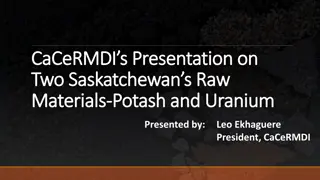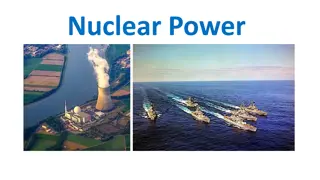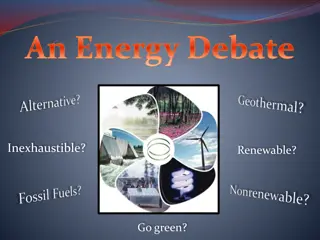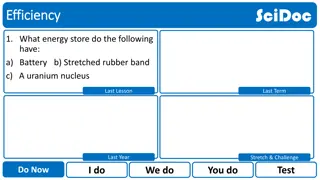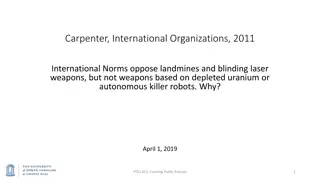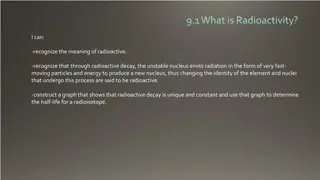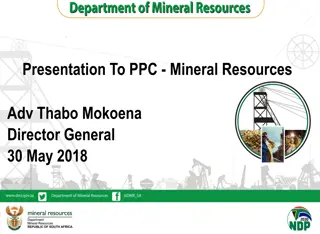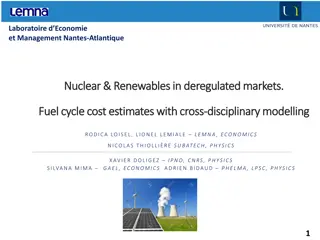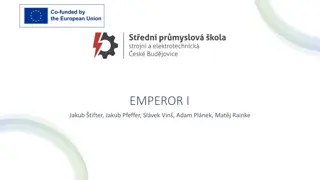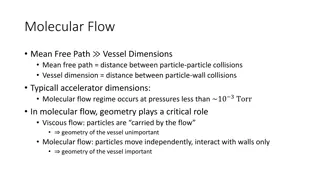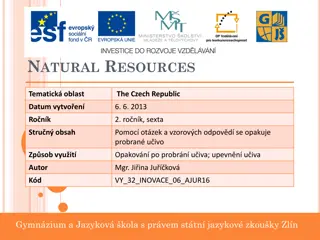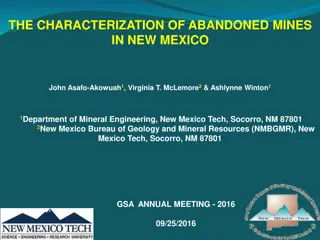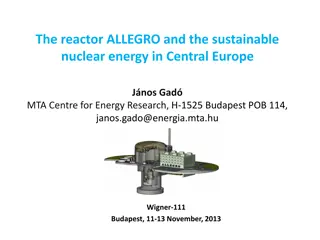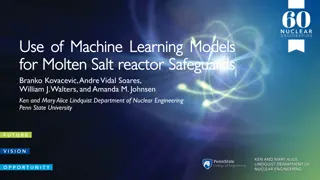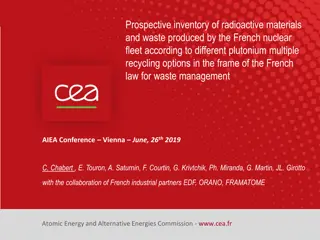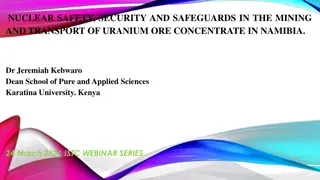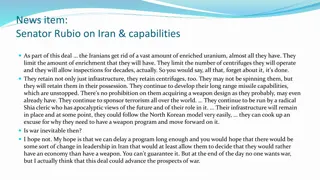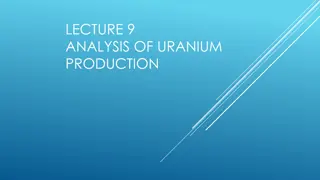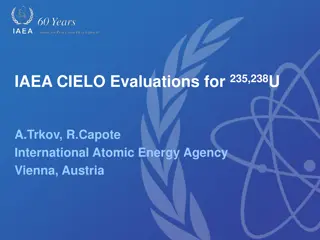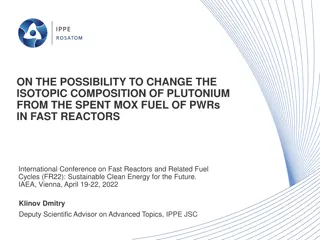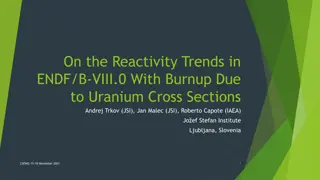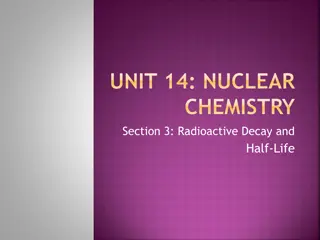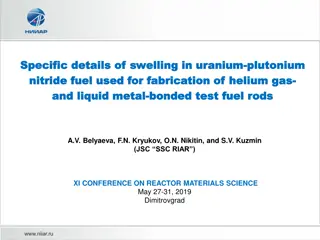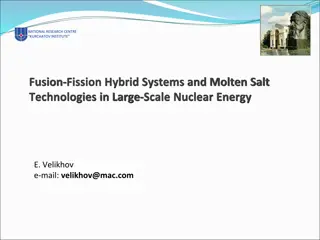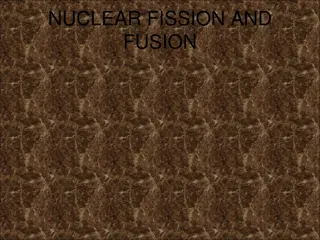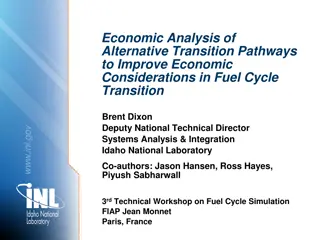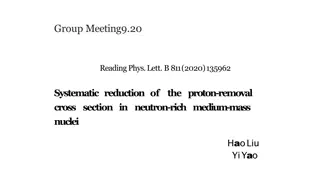Exploring Saskatchewan's Rich Resources: Potash and Uranium Presentation by CaCeRMDI
Saskatchewan is home to valuable raw materials like potash and uranium. This presentation by CaCeRMDI delves into the definitions, types, and facts about these resources. Learn about the significance of mineral-based raw materials, agricultural-based materials, and fossil fuels. Discover interesting
1 views • 17 slides
Exploring Nuclear Power: Benefits and Risks
Nuclear power plants derive energy from nuclear fission, offering advantages like minimal air emissions and potential extension of uranium supply. However, challenges such as thermal pollution, radioactive waste disposal, and the risk of accidents highlight the complex nature of nuclear energy. Acci
1 views • 9 slides
Environmental Math and Efficiency Analysis
Explore environmental math problems related to forest loss, uranium energy conversion, and energy transfer through trophic levels. Dive into calculations involving forested hectares, converting uranium into fluorescent light, and energy efficiency at different trophic levels.
1 views • 33 slides
Understanding the Debate on Inexhaustible vs. Nonrenewable Energy Sources
The energy debate revolves around the classification of energy sources into nonrenewable, renewable, and inexhaustible categories. Fossil fuels, such as coal, petroleum, and natural gas, fall under nonrenewable sources due to their finite nature, while wind and tidal energy are examples of inexhaust
0 views • 18 slides
Understanding Energy Efficiency in Devices
Energy efficiency is a crucial concept in understanding how well devices convert energy from one form to another. This summary covers the basics of energy stores, calculation of efficiency, and ways to improve efficiency in devices. Explore the different types of energy stores such as batteries, str
0 views • 15 slides
International Norms and Weapons Regulation: Analyzing the Selectivity of Bans
International norms exhibit selectivity in banning certain weapons like landmines and blinding laser weapons while permitting others such as depleted uranium-based arms and autonomous killer robots. The discrepancy raises questions about ethical outrage in weapon condemnation and the role of agenda-
0 views • 12 slides
Understanding Radioactivity and Nuclear Radiation
Radioactivity is the process in which unstable nuclei emit radiation, such as alpha, beta, or gamma particles, to become stable. This emission can change the element's identity and is crucial in fields like nuclear power and understanding Earth's core heat source. Different radioactive isotopes like
0 views • 12 slides
Understanding Radiation Pollution and Its Effects
Radiation pollution, whether ionizing or non-ionizing, is a significant environmental concern. Ionizing radiation can penetrate tissues and cause damage to living cells, while non-ionizing radiation may effectively sterilize microbes. Sources of radiation include cosmic rays, terrestrial elements li
0 views • 15 slides
Presentation on Mineral Resources by Adv. Thabo Mokoena - PPC
Explore the detailed presentation to PPC on mineral resources by Director General Adv. Thabo Mokoena. Covering topics like Tegeta Mines profile, equipment audits, personal protective gear, blasting equipment, accidents, and more. Discover insights into developments at Shiva Uranium, Optimum, and Lil
0 views • 41 slides
Understanding Radiation Pollution and Its Sources
Radiation pollution is a serious environmental concern caused by both ionizing and non-ionizing radiation. Ionizing radiation, such as alpha and beta particles and gamma rays, can lead to cellular damage, while non-ionizing radiation, like solar radiation, can also impact living organisms. Sources o
0 views • 15 slides
Understanding Nuclear Fusion and Fission in Atoms
Nuclear fusion is the process where two atomic nuclei combine, releasing energy and forming a new element. This process occurs in stars where hydrogen fuses to create heavier elements. On the other hand, nuclear fission involves the splitting of an atomic nucleus, releasing energy. Understanding the
3 views • 35 slides
Nuclear and Renewables in Deregulated Markets: Fuel Cycle Cost Estimates and Policy Options
Laboratoire d'Economie et Management Nantes-Atlantique study on capacity management, fuel cost factors, and market dynamics in nuclear and renewable energy sectors. Case study explores load-following impacts on uranium cycle. Discussion on centralized vs. decentralized market designs in the U.S. and
0 views • 29 slides
Revolutionary Engine Technology Presentation
Innovative presentation showcasing the EMPEROR.I engine concept designed by Jakub Tifter, Jakub Pfeffer, and team. It introduces a revolutionary engine model powered by water and uranium, mimicking a small nuclear power plant. The presentation covers vehicle benefits, disadvantages, design, and engi
0 views • 9 slides
Understanding Molecular Flow in Vacuum Systems
Molecular flow in vacuum systems occurs at low pressures where particles move independently, interacting mainly with the vessel's geometry. Tools like MolFlow+ and simulations help analyze pressure profiles and validate system designs. Geometry, outgassing, and pumping speeds are critical factors im
0 views • 11 slides
Natural Resources and Mineral Deposits in the Czech Republic
The Czech Republic's natural resources include renewable sources like sun energy and water, as well as non-renewable resources such as mineral deposits and fuels like black coal and oil. The country has rich non-metal deposits and varied metal deposits. Mineral deposits are abundant, with significan
0 views • 8 slides
Characterization of Abandoned Mines in New Mexico: A Study on Legacy Uranium Mines
The study delves into the characterization of abandoned mines in New Mexico, particularly focusing on legacy uranium mines like Lucky Don, Little Davie, and Jeter. It explores the background of mining activities in the region, the study areas, and the potential environmental and stability threats po
1 views • 24 slides
Advancing Sustainable Nuclear Energy in Central Europe with Fast Reactors
Explore the potential of G4 fast reactors for advancing sustainable nuclear energy in Central Europe. Learn how fast neutron spectrum reactors can help address uranium stock depletion, waste elimination, and fuel cycle closure. Discover the regional long-term solution proposed for V4 countries and t
0 views • 12 slides
Machine Learning for Molten Salt Reactor Safeguards
Molten salt reactors face challenges in material accounting due to liquid fuel which precludes traditional safeguards. This project proposes a two-step approach involving the development of measurement signatures created by material diversion, and a machine learning model to distinguish normal react
1 views • 18 slides
Prospective Inventory of Radioactive Materials and Waste Management Study in French Nuclear Fleet
The study conducted by the French Atomic Energy Commission in collaboration with industrial partners like EDF, Orano, and Framatome explores different plutonium recycling options in the French nuclear fleet. It assesses scenarios involving open cycle, mono-recycling, and multiple recycling of pluton
0 views • 16 slides
Resource Rich Central Asia: Overview of Energy and Mineral Reserves
Central Asia, comprising countries like Kazakhstan, Kyrgyz Republic, Uzbekistan, Turkmenistan, and Tajikistan, is abundant in mineral and energy resources. From vast oil and gas fields to substantial uranium and gold reserves, these nations play a significant role in global resource markets. The reg
0 views • 16 slides
Nuclear Safety and Security in Uranium Mining in Namibia
This report discusses nuclear safety, security, and safeguards in the mining and transportation of uranium ore concentrate in Namibia. It explores the current frameworks, challenges, and opportunities, aiming to strengthen the existing policies and propose strategies for regional alignment. The meth
0 views • 29 slides
Senator Rubio's Perspective on Iran's Capabilities and the Consequences of the Deal
Senator Rubio highlights the concerns regarding the Iran nuclear deal, emphasizing that while certain restrictions are imposed on Iran's uranium enrichment, the country retains significant capabilities, including long-range missiles and sponsorship of terrorism. He raises the possibility of war and
0 views • 22 slides
Analysis of Uranium Production in Central Asia: Focus on Kazakhstan
Central Asia, particularly Kazakhstan, has emerged as a significant player in uranium production. With over 50 known uranium deposits and a shift towards in situ leaching (ISL) mining, Kazakhstan has become the world's leading uranium producer. Kazatomprom, the national atomic company, plays a cruci
0 views • 26 slides
IAEA CIELO Evaluations for Uranium Isotopes & Criticality Benchmarks Report
This report discusses the IAEA CIELO evaluations for uranium isotopes, focusing on the impact of Standards_2016 on criticality predictions, adjustments in nuclear model calculations using the Empire code, and incorporation of experimental data to enhance performance in integral benchmarks.
0 views • 7 slides
Innovations in Reprocessing Spent MOX Fuel for Sustainable Nuclear Energy
Discussion at the FR22 Conference focuses on the potential for fast reactors to modify the isotopic composition of plutonium from spent MOX fuel of PWRs. By utilizing fast reactors like BN-800, countries can alter the fissile isotopes in plutonium, enabling its reuse in thermal reactors and effectiv
0 views • 8 slides
Reactivity Trends in ENDF/B-VIII.0 with Burnup: Insights and Comparisons
A comprehensive overview of reactivity trends in ENDF/B-VIII.0 due to uranium cross-sections and burnup, highlighting differences from ENDF/B-VII.1. Focus areas include loss of reactivity in PWRs, discrepancies in individual nuclide substitution, and updates in U-235 evaluation. Notable changes in U
0 views • 17 slides
Understanding Radioactive Decay and Half-Life in Nuclear Chemistry
Exploring the concept of radioactive decay and half-life in nuclear chemistry, this content covers the types of nuclear radiation, alpha decay of Uranium, and the significance of half-life in determining the decay of radioactive substances such as Carbon-14. An example with Fluorine-18 illustrates t
0 views • 9 slides
Investigation of Swelling in Uranium-Plutonium Nitride Fuel for Helium Gas Fabrication and Liquid Metal-Bonded Test Fuel Rods
This study examines the specific details of swelling in uranium-plutonium nitride fuel used for fabrication of helium gas and liquid metal-bonded test fuel rods. Key irradiation parameters, examination techniques, and the structural and phase state of SNUP fuel after low-temperature irradiation are
0 views • 18 slides
Innovative Technologies for Nuclear Power Development Until 2050
The National Research Centre Kurchatov Institute is exploring fusion-fission hybrid systems and molten salt technologies for large-scale nuclear energy. Global energy consumption scenarios project an increase in needs from 10 GTFOE in 2000 to 15-35 GTFOE by 2050 and 20-50 GTFOE by 2100. Challenges i
0 views • 27 slides
Understanding Nuclear Fission: Process, Examples, and Energy Generation
Nuclear fission involves the splitting of an atomic nucleus, with uranium-235 being a commonly used fissile material. When uranium-235 undergoes fission, it produces fission fragments, neutrons, gamma radiation, and kinetic energy. The fission process can be initiated by absorbing a slow-moving neut
0 views • 19 slides
Economic Analysis of Alternative Transition Pathways in Fuel Cycle
This study explores economic considerations in fuel cycle transition by analyzing alternative pathways to improve efficiency and reduce costs. Strategic buildout and leveraging of low-enriched uranium for fast reactors are key strategies to enhance the economics of transition pathways. The research
0 views • 33 slides
Systematic Reduction of Proton-Removal Cross Section in Neutron-Rich Medium-Mass Nuclei
Single-nucleon knock-out reactions in neutron-rich medium-mass nuclei were studied to investigate the reduction of proton-removal cross section. Short-range correlated nucleon pairs, especially protons, were found to impact the probability of single-proton removal processes. Experimental measurement
0 views • 8 slides
Geography of Africa South of the Sahara - Physical Features, Climate, and Economy
Explore the physical geography of Africa south of the Sahara, including features like fault lines, savannas, deltas, and escarpments. Learn about the effects of harmful actions on the environment like desertification. Discover the diverse climate regions, from wet tropical rainforests to arid desert
0 views • 23 slides
